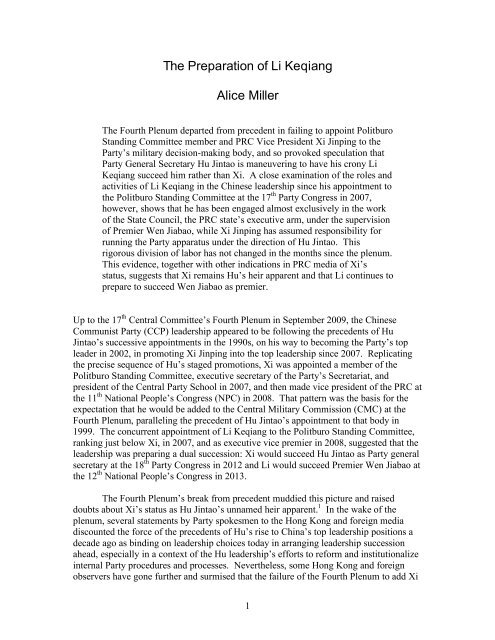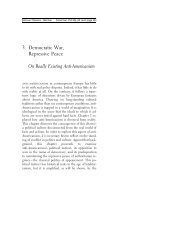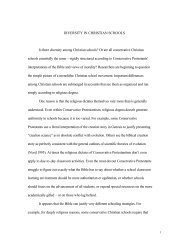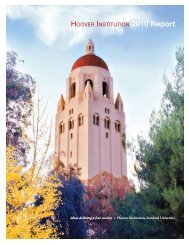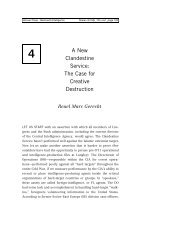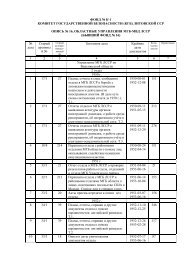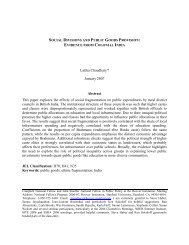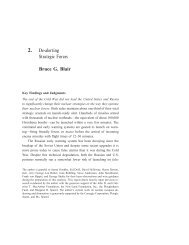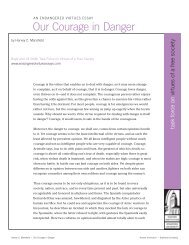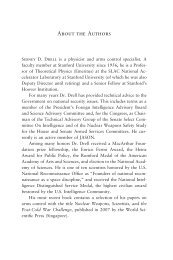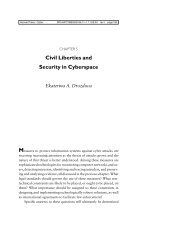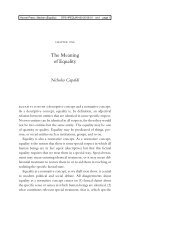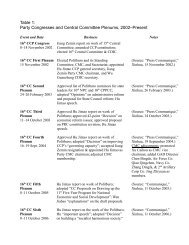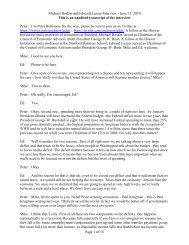The Preparation of Li Keqiang - Hoover Institution
The Preparation of Li Keqiang - Hoover Institution
The Preparation of Li Keqiang - Hoover Institution
You also want an ePaper? Increase the reach of your titles
YUMPU automatically turns print PDFs into web optimized ePapers that Google loves.
<strong>The</strong> <strong>Preparation</strong> <strong>of</strong> <strong>Li</strong> <strong>Keqiang</strong><br />
Alice Miller<br />
<strong>The</strong> Fourth Plenum departed from precedent in failing to appoint Politburo<br />
Standing Committee member and PRC Vice President Xi Jinping to the<br />
Party’s military decision-making body, and so provoked speculation that<br />
Party General Secretary Hu Jintao is maneuvering to have his crony <strong>Li</strong><br />
<strong>Keqiang</strong> succeed him rather than Xi. A close examination <strong>of</strong> the roles and<br />
activities <strong>of</strong> <strong>Li</strong> <strong>Keqiang</strong> in the Chinese leadership since his appointment to<br />
the Politburo Standing Committee at the 17 th Party Congress in 2007,<br />
however, shows that he has been engaged almost exclusively in the work<br />
<strong>of</strong> the State Council, the PRC state’s executive arm, under the supervision<br />
<strong>of</strong> Premier Wen Jiabao, while Xi Jinping has assumed responsibility for<br />
running the Party apparatus under the direction <strong>of</strong> Hu Jintao. This<br />
rigorous division <strong>of</strong> labor has not changed in the months since the plenum.<br />
This evidence, together with other indications in PRC media <strong>of</strong> Xi’s<br />
status, suggests that Xi remains Hu’s heir apparent and that <strong>Li</strong> continues to<br />
prepare to succeed Wen Jiabao as premier.<br />
Up to the 17 th Central Committee’s Fourth Plenum in September 2009, the Chinese<br />
Communist Party (CCP) leadership appeared to be following the precedents <strong>of</strong> Hu<br />
Jintao’s successive appointments in the 1990s, on his way to becoming the Party’s top<br />
leader in 2002, in promoting Xi Jinping into the top leadership since 2007. Replicating<br />
the precise sequence <strong>of</strong> Hu’s staged promotions, Xi was appointed a member <strong>of</strong> the<br />
Politburo Standing Committee, executive secretary <strong>of</strong> the Party’s Secretariat, and<br />
president <strong>of</strong> the Central Party School in 2007, and then made vice president <strong>of</strong> the PRC at<br />
the 11 th National People’s Congress (NPC) in 2008. That pattern was the basis for the<br />
expectation that he would be added to the Central Military Commission (CMC) at the<br />
Fourth Plenum, paralleling the precedent <strong>of</strong> Hu Jintao’s appointment to that body in<br />
1999. <strong>The</strong> concurrent appointment <strong>of</strong> <strong>Li</strong> <strong>Keqiang</strong> to the Politburo Standing Committee,<br />
ranking just below Xi, in 2007, and as executive vice premier in 2008, suggested that the<br />
leadership was preparing a dual succession: Xi would succeed Hu Jintao as Party general<br />
secretary at the 18 th Party Congress in 2012 and <strong>Li</strong> would succeed Premier Wen Jiabao at<br />
the 12 th National People’s Congress in 2013.<br />
<strong>The</strong> Fourth Plenum’s break from precedent muddied this picture and raised<br />
doubts about Xi’s status as Hu Jintao’s unnamed heir apparent. 1 In the wake <strong>of</strong> the<br />
plenum, several statements by Party spokesmen to the Hong Kong and foreign media<br />
discounted the force <strong>of</strong> the precedents <strong>of</strong> Hu’s rise to China’s top leadership positions a<br />
decade ago as binding on leadership choices today in arranging leadership succession<br />
ahead, especially in a context <strong>of</strong> the Hu leadership’s efforts to reform and institutionalize<br />
internal Party procedures and processes. Nevertheless, some Hong Kong and foreign<br />
observers have gone further and surmised that the failure <strong>of</strong> the Fourth Plenum to add Xi<br />
1
2<br />
Miller, China Leadership Monitor, No. 31<br />
to the CMC indicates that Hu Jintao is now seeking to overturn Xi’s succession in favor<br />
<strong>of</strong> <strong>Li</strong> <strong>Keqiang</strong>.<br />
<strong>Li</strong> <strong>Keqiang</strong><br />
If <strong>Li</strong> <strong>Keqiang</strong> were now being pressed as a contender to succeed Hu, one might expect to<br />
see some attempt to broaden his work responsibilities to include functions that prepare<br />
him and demonstrate his readiness to assume the functions that Hu Jintao performs as<br />
Party leader, head <strong>of</strong> state, and military decision-maker. Such an effort would necessarily<br />
blur the sharp division <strong>of</strong> work allotted between <strong>Li</strong> <strong>Keqiang</strong> and Xi Jinping since the<br />
Party congress in 2007. So far, that has not been the case.<br />
In the immediate wake <strong>of</strong> his appointment to the Politburo at the 17 th CCP<br />
Congress in October 2007, <strong>Li</strong> made very few public appearances, a limbo that indicated<br />
he was awaiting appointment at the 11 th NPC the following March. This impression was<br />
reinforced, moreover, by <strong>Li</strong>’s promotion onto the Politburo Standing Committee at the<br />
Party congress, which—given the normal division <strong>of</strong> policy labor among members <strong>of</strong> that<br />
body—indicated that he would become the first-ranking executive vice premier, working<br />
directly with Premier Wen Jiabao.<br />
<strong>The</strong>se expectations were confirmed by the 11 th NPC’s appointments to the State<br />
Council in March 2008. <strong>Li</strong> was appointed the front-ranking among four vice premiers.<br />
He immediately began a heavy schedule <strong>of</strong> frequent public appearances in that role, <strong>of</strong><br />
speaking responsibilities on behalf <strong>of</strong> himself and <strong>of</strong> the premier, <strong>of</strong> meetings with<br />
foreign leaders and foreign travel in connection with State Council business, and as<br />
authoritative spokesman on the entire range <strong>of</strong> government affairs, including the<br />
economy, energy, environment, health care issues, food safety, and climate change.<br />
In addition, <strong>Li</strong> appears to be Wen Jiabao’s deputy in presiding over the powerful<br />
Central Committee Finance and Economy Leading Small Group. 2 <strong>Li</strong> also serves as<br />
Wen’s deputy in leading the National Leading Group for Climate Change Response,<br />
Energy Conservation, and Pollution Reduction Work, an important body that prepared<br />
Beijing’s approach to the Copenhagen summit on climate change in December 2009.<br />
In addition, <strong>Li</strong> has assumed leadership <strong>of</strong> at least eight other State Council policy<br />
coordination groups. <strong>The</strong>se are:<br />
• Director, State Council South-to-North Water Diversion Project<br />
• Director, State Council Second National Economic Census Leading Group<br />
• Director, State Council Second National Land Survey Leading Group<br />
• Director, State Council Medicine and Health Care Systems Reform Leading Group<br />
• Chairman, Three Gorges Dam Project Construction Committee<br />
• Chairman, State Council AIDS Prevention and Treatment Work Committee<br />
• Chairman, National Patriotic Health Movement Committee
3<br />
Miller, China Leadership Monitor, No. 31<br />
• Chairman, China Council for International Cooperation on Environment and<br />
Development<br />
Many <strong>of</strong> <strong>Li</strong>’s public appearances are in connection with these specific policy<br />
sectors. For example, he has been the frontline spokesman cited in PRC media on<br />
China’s response to the threat <strong>of</strong> AIDS and the H1N1 virus, and on 1 December 2009<br />
accompanied Premier Wen in that capacity in visiting AIDS patients in a Beijing hospital.<br />
On 11 November 2009, <strong>Li</strong> delivered the keynote speech at the annual meeting <strong>of</strong> the<br />
China Council for International Cooperation on Environment and Development, stressing<br />
the need for China to adapt to the emerging “revolution in clean energy, energy saving,<br />
emission-reducing and other new technology.” (Xinhua, 11 November 2009)<br />
<strong>Li</strong> has also emerged as an authoritative spokesman, second only to Wen Jiabao,<br />
on Beijing’s economic policy line. On 11 December 2009, for example, <strong>Li</strong> delivered the<br />
summary speech to a forum <strong>of</strong> several provincial leaders convened to review the<br />
guidelines for economic work in the coming year set down at the annual central<br />
conference on economic work earlier that month (Xinhua, 11 December 2009). As he<br />
had in January 2009, on 11 January <strong>Li</strong> again delivered the keynote speech to the annual<br />
national conference on finance work (Xinhua, 12 January 2010). As all members <strong>of</strong> the<br />
Politburo Standing Committee do, <strong>Li</strong> undertakes periodic inspection tours <strong>of</strong> China’s<br />
provinces. During these trips, <strong>Li</strong>’s publicized remarks almost always deal with economic<br />
policy issues as they pertain to the local conditions he observes.<br />
<strong>Li</strong>’s foreign travels and interactions with visiting foreigners have similarly been<br />
focused on his role in the State Council. <strong>Li</strong> has traveled abroad four times since<br />
becoming vice premier in March 2008:<br />
• In December 2008 he took his first trip, visiting Indonesia, Egypt and Kuwait, during<br />
which his discussions focused on economic and energy issues.<br />
• In June 2009 he visited Turkmenistan, Uzbekistan, and Finland, again discussing<br />
energy and economic issues.<br />
• In November 2009 he visited Australia, New Zealand, and Papua New Guinea,<br />
discussing regional economic cooperation and attending the opening <strong>of</strong> the PRCsponsored<br />
Confucius Institute at Canterbury University.<br />
• In January 2010 he attended the World Economic Forum at Davos, Switzerland. In<br />
2009, as the world economic crisis was unfolding, Wen Jiabao attended the Davos<br />
meeting.<br />
In addition, a review <strong>of</strong> <strong>Li</strong>’s meetings with foreigners visiting Beijing over the<br />
past eight months shows that, despite his status as a high-ranking CCP leader, he has not<br />
been publicized meeting any visiting party leaders or delegations. All <strong>of</strong> his interactions<br />
have been in his capacity as vice premier and with visitors from foreign national and<br />
local governments, from international organizations, or former state <strong>of</strong>ficials.<br />
In broad respects, the scope and specifics <strong>of</strong> <strong>Li</strong> <strong>Keqiang</strong>’s activities replicate<br />
those <strong>of</strong> Wen Jiabao in the 1998–2003 period, though with some differences. For one
4<br />
Miller, China Leadership Monitor, No. 31<br />
thing, Wen was not executive vice premier under Zhu Rongji. Instead, <strong>Li</strong> Lanqing served<br />
in that capacity, but, as a longtime expert on China’s foreign trade, he owed his standing<br />
in part to Beijing’s ongoing efforts to gain membership in the World Trade Organization,<br />
and was expected to retire at the end <strong>of</strong> his term because <strong>of</strong> age. Wen did serve as<br />
secretary-general on the Central Committee’s Finance and Economy Leading Small<br />
Group, behind Zhu Rongji and Vice Premier Wu Bangguo, and also chaired that body’s<br />
Finance Leading Small Group. In the current configuration <strong>of</strong> the State Council<br />
executive committee (which includes the premier, vice premiers, and state councilors), <strong>Li</strong><br />
has no obvious competition for the post <strong>of</strong> premier. All three <strong>of</strong> the other vice<br />
premiers—Hui <strong>Li</strong>angyu, Zhang Dejiang, and Wang Qishan—are in their early to mid-<br />
60s and so are likely to retire (in Hui’s and Zhang’s cases) or could not serve more than<br />
one term as premier without violating age limits.<br />
Xi Jinping since the Fourth Plenum<br />
From the start, Xi’s foremost role has been to assist Hu Jintao in running the Party<br />
apparatus, principally as head <strong>of</strong> the Secretariat. In that role, Xi presented the lists <strong>of</strong><br />
Politburo nominations for the leading NPC and State Council posts at the February 2008<br />
Second Plenum, preceding the convocation <strong>of</strong> the 11 th NPC the following month. As Hu<br />
did during his preparation to assume power, Xi also presides over the Central Party<br />
School, a position from which he has the opportunity to establish relationships with the<br />
Party’s rising generation <strong>of</strong> future leaders and to direct policy research serving the top<br />
leadership.<br />
As Hu Jintao did from 1992 to 2002, Xi serves as head <strong>of</strong> the Party-Building<br />
Leading Small Group. In that capacity, Xi directed the drafting team that produced the<br />
“Decision” on Party reform adopted at the Fourth Plenum and delivered the report at the<br />
plenum explaining the document’s purposes. Xi has also directed the Party’s 18-month<br />
campaign to study the “scientific development concept,” launched in September 2007 and<br />
presently winding down. In addition, Xi serves as deputy head <strong>of</strong> the Foreign Affairs<br />
Leading Small Group, under Hu Jintao, and directs the Hong Kong-Macao Leading Small<br />
Group. Starting in February 2008, Xi presided over the leadership group directing<br />
preparations for the 2008 Beijing Olympics.<br />
More broadly, Xi’s speeches and remarks to domestic audiences focus heavily on<br />
Party affairs and political issues, in contrast to <strong>Li</strong>’s concentration on economic and<br />
related matters. Xi’s publicized comments during routine inspection tours <strong>of</strong> China’s<br />
provinces normally address Party concerns, such as the ongoing campaign to study the<br />
“scientific development concept” and the need for intra-party democracy. On 30 June<br />
2009, Xi delivered the keynote speech at a forum marking the Party’s 88 th anniversary.<br />
Since his appointment to the Politburo Standing Committee and as PRC vice<br />
president, Xi has traveled abroad on state visits four times, including two trips since the<br />
Fourth Plenum. In June 2008 he went to Pyongyang—a visit that included a meeting<br />
with North Korean supreme leader Kim Jong-il—Mongolia, Saudi Arabia, Qatar, and
6<br />
Miller, China Leadership Monitor, No. 31<br />
at all or, at best, in Xi’s capacity as head <strong>of</strong> the CCP Secretariat (the counterpart <strong>of</strong> the<br />
VCP Secretariat). But Xi was reported receiving Dung in his capacity as Politburo<br />
member and vice president, not as head <strong>of</strong> the Secretariat. 3 In addition, Dung’s other<br />
reported meetings in Beijing were strictly with high-ranking PLA leaders—Minister <strong>of</strong><br />
National Defense <strong>Li</strong> Guanglie and General Political Department Director <strong>Li</strong> Jinai, both <strong>of</strong><br />
whom are CMC members.<br />
Implications<br />
<strong>The</strong> continuation <strong>of</strong> Xi Jinping and Wen Jiabao in their respective roles suggests that they<br />
continue to prepare for what is intended as a succession in tandem in 2012 and after. It<br />
does not entirely rule out the possibility, as some observers have proposed, that Hu Jintao<br />
is working to overturn Xi’s succession on behalf <strong>of</strong> his crony <strong>Li</strong> <strong>Keqiang</strong>—only that Hu<br />
has not yet sought to alter <strong>Li</strong>’s work routines to improve his credentials to succeed to the<br />
top Party, state, and military posts.<br />
However, the costs <strong>of</strong> overturning what appear to have been consensus-driven<br />
arrangements set down at the 17 th Party Congress in October 2007 for leadership<br />
succession in 2012–2013 would seem to be high. China’s political order now governs a<br />
far more complex economy and society than in Mao’s day, when succession was always<br />
subject to the personal whims and shifting political preferences <strong>of</strong> the great helmsman.<br />
Governance in China today requires far greater stability and predictability in politics—<br />
including in the politics <strong>of</strong> leadership succession—than in the Mao era. In his day, Deng<br />
Xiaoping worked mightily to establish institutionalized political processes to constrain<br />
the rise <strong>of</strong> a Stalin or Mao-like dictator in a collective leadership and to prevent a return<br />
to the free-for-all leadership conflict that characterized the last two decades <strong>of</strong> Mao’s<br />
rule. In addition, Beijing has a powerful interest in projecting political stability in a<br />
period <strong>of</strong> economic stress at home and internationally and <strong>of</strong> strategic uncertainty and<br />
potential transition in the global structure <strong>of</strong> power. Hu Jintao as well as anyone certainly<br />
understands these things; much <strong>of</strong> his tenure as top leader has been devoted to managing<br />
such priorities.<br />
In that regard, it may be, as was previously discussed in the Monitor, that Hu is<br />
working to establish new, more institutionalized and “democratic” procedures for<br />
promoting top leaders. In that light, the failure <strong>of</strong> the Fourth Plenum may indicate that<br />
such new procedures will be deployed at making the next wave <strong>of</strong> CCP leadership<br />
appointments in the pending transition in 2012–2013. It is also possible that Hu is<br />
simultaneously using such new procedures to bend the outcome in favor <strong>of</strong> his crony <strong>Li</strong><br />
<strong>Keqiang</strong>. 4 If so, however (unless <strong>Li</strong> <strong>Keqiang</strong>’s portfolio <strong>of</strong> work responsibilities<br />
broadens soon), it would seem that Hu would be pressing for the succession <strong>of</strong> a leader<br />
with far fewer credentials by way <strong>of</strong> preparation and experience relevant to the top<br />
posts—a leader also tagged with the taint <strong>of</strong> cronyism—in place <strong>of</strong> one deliberately<br />
prepared in those roles to succeed and whose credentials would seem to make his<br />
succession a foregone conclusion.
7<br />
Miller, China Leadership Monitor, No. 31<br />
Notes<br />
1 For analyses <strong>of</strong> the Fourth Plenum’s failure to appoint Xi Jinping to the Central Military Commission, see<br />
the articles by this author and by James Mulvenon in China Leadership Monitor, No. 30 (Fall 2009).<br />
2 PRC media do not routinely report the current memberships <strong>of</strong> any <strong>of</strong> the several leading small groups <strong>of</strong><br />
the Party Central Committee, including this one. But <strong>Li</strong>’s appointment is consistent with past staffing <strong>of</strong><br />
the Finance and Economy Leading Small Group and is attested to by two un<strong>of</strong>ficial mainland directories, as<br />
well as by non-communist Hong Kong media. See “<strong>The</strong> CCP Central Committee’s Leading Small<br />
Groups,” in China Leadership Monitor, No. 26 (Fall 2008).<br />
3 In contrast to Xinhua’s Chinese-language dispatch and the account in People’s Daily, Xinhua’s Englishlanguage<br />
dispatch identified Xi only as vice president.<br />
4 See “<strong>The</strong> Case <strong>of</strong> Xi Jinping and the Mysterious Succession,” China Leadership Monitor, No. 30 (Fall<br />
2009), 8–9.


